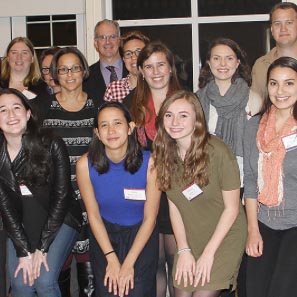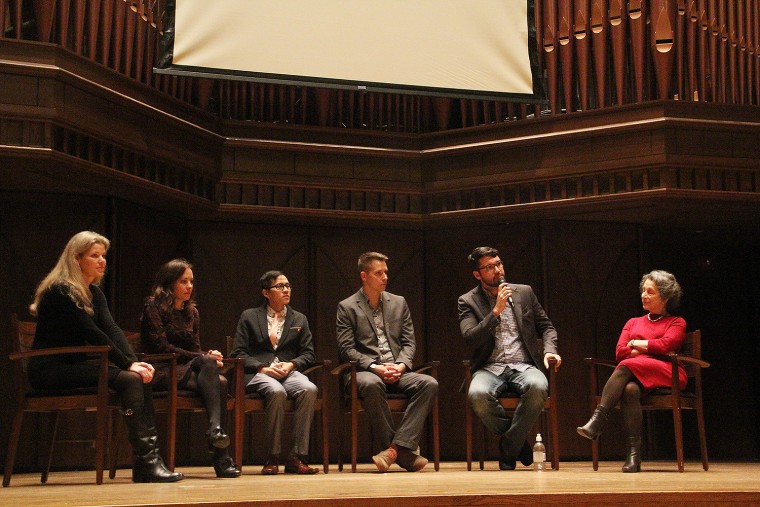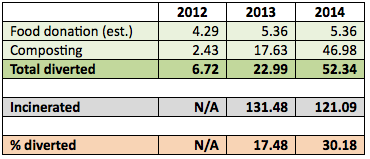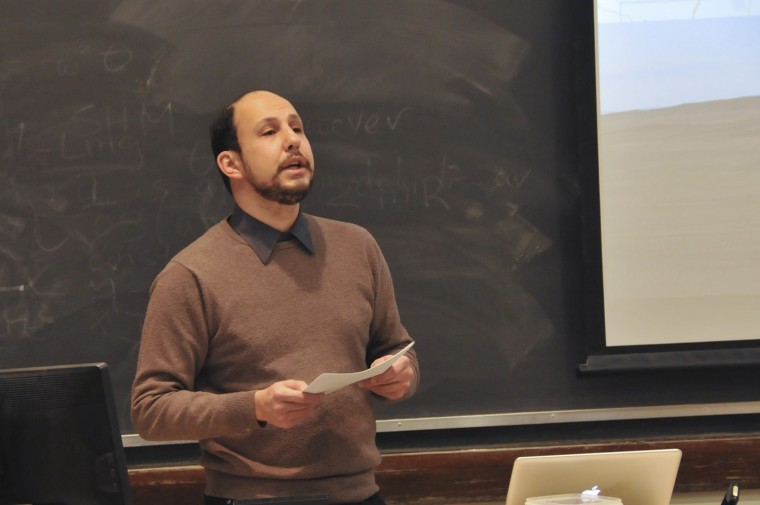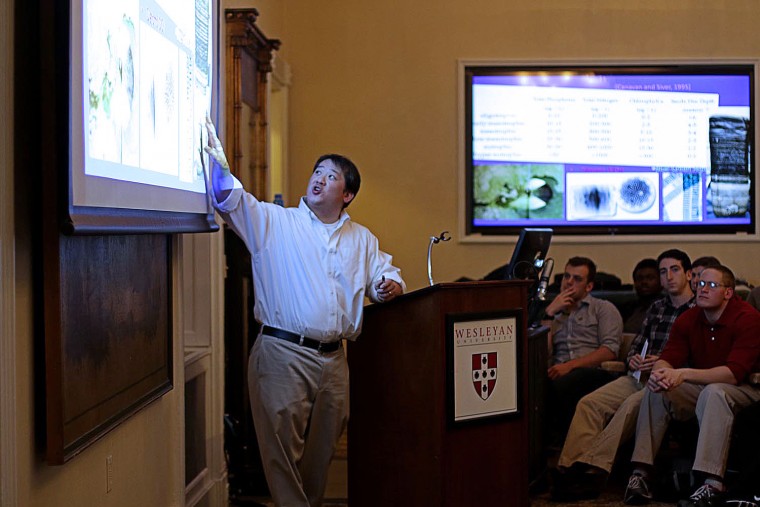The gift-giving season came early for four non-profit organizations in the local community. On Dec. 7, a class of 10 innovative problem solvers with an interest in philanthropy, awarded $10,000 in grant funds to selected organizations. As part of the the course Money and Social Change: Innovative Paradigms and Strategies, students spent the fall semester thinking about the role of capital in social change. Students researched the mission statements of 188 organizations in Middlesex County, compared them side by side, and after a final six-hour voting process, whittled their selection to four. The surprise monetary awards, provided to the class by the Learning by…
In 2010, James Kaplan ’73 had a national bestseller with Frank: The Voice, an acclaimed biography which told the story of singer Frank Sinatra's meteoric rise to fame, subsequent failures, and reinvention as a star of live performances and screen. In his new book, Sinatra: The Chairman (Doubleday), Kaplan continues the singer’s story, starting with the day after Sinatra claimed his Academy Award for From Here to Eternity in 1954 and had reestablished himself as a top recording artist. After winning the Oscar, he was extremely busy with recording albums and singles, shooting several movies a year, and appearing on TV…
In his recently released debut film Mediterranea (IFC Films), director and writer Jonas Carpignano ’06 focuses on two friends from West Africa’s Burkina Faso (played by non-professional actors Koudous Seihon and Alassane Sy) who take a hazardous journey to Calabria, Italy, across the Mediterranean Sea, hoping to better their economic fortunes. Carpignano recently received two awards for his work: the Independent Film Project’s Gotham Award for Bingham Ray Breakthrough Director and the Best Directorial Debut Award from the National Board of Review. In his New York Times review of the film, Stephen Holden writes that Carpignano “has adopted a low-key neorealist…
Professor of Anthropology Gina Athena Ulysse is the author of two new essays on The Huffington Post. In "Pedagogies of Belonging," she writes about her experience working with students of color as they face the realities of structural racism, and she challenges institutions to go beyond rhetoric, to face up to the difficult challenges of moving onto a path of greater belonging. The essay begins: There is a conversation Black faculty often have with Black students that we rarely mention in public, let alone in mixed company. The tone of this exchange differs to some extent if the student are U.S.…
Wesleyan's First Year Seminar Program (FYS) is benefiting from a three-year, $225,000 grant from The Endeavor Foundation of New York. The FYS program is part of a comprehensive effort to realize the potential of the first year of college to be academically transformative. With the Foundation’s support, Wesleyan will expand and enhance the program. This fall 43 FYS courses were offered to students; 10 FYS will be offered in the spring. “The FYS program is a key part of our structure to support development of multiple student competencies, in this case in the area of writing, and to tie competency-building…
During Wesleyan Thinks Big, six faculty delivered 10-minute inspirational lectures on topics they are personally passionate about. The student-run event took place Dec. 10 in Memorial Chapel.
#THISISWHY For the second consecutive year, Wesleyan recently was recognized by the U.S. Environmental Protection Agency (EPA) for its work diverting food waste. It is the only educational institution in Connecticut to receive a "Regional Food Recovery Achievement Certificate." Wesleyan joined the EPA's Food Recovery Challenge in 2013. Through this program, organizations pledge to improve their sustainable food management practices and report results. Organizations are encouraged to follow the EPA's Food Recovery Hierarchy to prioritize their actions to prevent and divert food waste. The hierarchy suggests a range of options, from reducing the volume of surplus food generated and donating extra food…
On Dec. 8, Wesleyan received a grant from the National Endowment of the Arts and two grants from National Endowment for the Humanities. The grants will support a poetry program at Wesleyan University Press, a faculty fellowship, and electronic dance and theater publications. The NEA provided an Art Works award of $25,000 to Wesleyan University Press to support its poetry program. The Art Works category of the NEA supports the creation and presentation of both new and existing work — a goal that aligns with the mission of the Wesleyan University Press, a program that has already published an internationally renowned…
Tricia Homer ’03 was selected as one of "40 under 40" by Prince George’s County Social Innovation Fund. The co-founder of HGVenture, a management consulting firm that specializing in nonprofit capacity building and leadership development, she also is chairperson of the College Park Community Foundation Board of Directors, which supports local nonprofits in capacity building. Additionally, she is cochair of the City of College Park Education Advisory Board and is the assistant director of the Office of Community Engagement at the University of Maryland. To recognize her contributions to the lives of multi-ethnic students at the University of Maryland, last…
In an essay published on The Washington Post's "Answer Sheet" blog, President Michael Roth responds to those in the media who see political correctness "run amok" on college campuses. "I work with students everyday, and I have had protesters at my office, and I don’t see their realities reflected in public discourse," he writes. Roth sees political correctness as a "charismatic bogeyman with strange powers to titillate liberal and conservative writers alike." (more…)
Students from Associate Professor of Earth and Environmental Sciences Timothy Ku’s Environmental Geochemistry class presented their findings regarding the geochemical makeup of Lake Hayward in East Haddam, Conn., to almost two dozen members of the Lake Hayward and Wesleyan communities on Dec. 2 in a presentation at the Russell House. The class is part of Wesleyan’s Service Learning Program spearheaded by Rob Rosenthal, director of Allbritton Center for the Study of Public Life, the John E. Andrus Professor of Sociology. “Working in science, it's always fulfilling when you have people who care about the information you’re looking at,” said Zachary Kaufman ‘16.…


